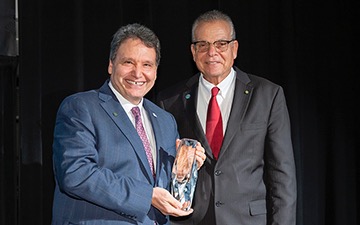Featured image by Spinnaker Creative Team.
Joseph Marion Hernández was the first Hispanic-American to be elected to Congress on this day in 1822 — almost 50 years before Hiram Rhodes Revels, the first Black Congressman, was elected.
Born Jose Mariano Hernández in St. Augustine to Minorcan indentured servants in 1788, he learned trading from his father, who acquired some wealth as a skilled carpenter. The family gained some land and owned slaves — an uncommon thing at the time.
Hernández received education from local Catholic priests and studied law in Savannah, Georgia, and Havana, Cuba.
When he returned to Florida in 1811, the Patriot War of 1812 was in motion– furthering tensions between the United States and Spain over territory.
Hernández fought for Spain against the U.S. efforts to seize more land. During that time, he married a widow named Ana Hill Williams, who inherited Orange Grove, a 3,200-acre plantation from her first marriage. For his loyalty in the war, Spain granted Hernández more land.
After the First Seminole War and the signing of a cession treaty between the United States and Spain in 1819, Hernández owned and controlled 25,670 acres in Florida.
In contrast to his fellow Hispanics, Hernández chose to stay in northeast Florida and change his name to Joseph Marion Hernández.
Florida wasn’t a state yet, but Governor William Pope DuVal nominated Hernández as Territory Delegate to Congress. Besides preparing Florida for statehood, Hernández didn’t have voting privileges, especially as a Hispanic Catholic among the prominent Anglo-American Protestant members ranked higher.
But Hernández had the edge of being bilingual, a man of self-attained wealth as a planter, and a highly regarded soldier who fought in two significant wars. He advocated for Florida to be a major asset to the U.S. military and commerce, submitting a Congressional funding petition to construct highway 275.
However, after a short run as Territory Delegate of two years and a sad loss at his second run for Congress, Hernández continued to run his three plantations.
Later on, he went to fight in the Second Seminole War, which negatively affected him both politically and financially.
The damage was beyond repair, so Hernández remained active in local politics which made him mayor of St. Augustine in 1848. Afterward, he moved to Matanzas, Cuba, where he lived the rest of his life until 1857 — dying at 69.
Hernández’s reputation and significance prompted Washington’s City Gazzet to say: “A compliment is due to the zeal and industry of the honorable delegate from Florida, who during the session, appeared at all times attentive to the objects connected with the prosperity of his constituents and the interests of the Territory.”
Stick around for more highlights about other Hispanic leaders throughout Northeast Florida.
__
For more information or news tips, or if you see an error in this story or have any compliments or concerns, contact editor@unfspinnaker.com.















